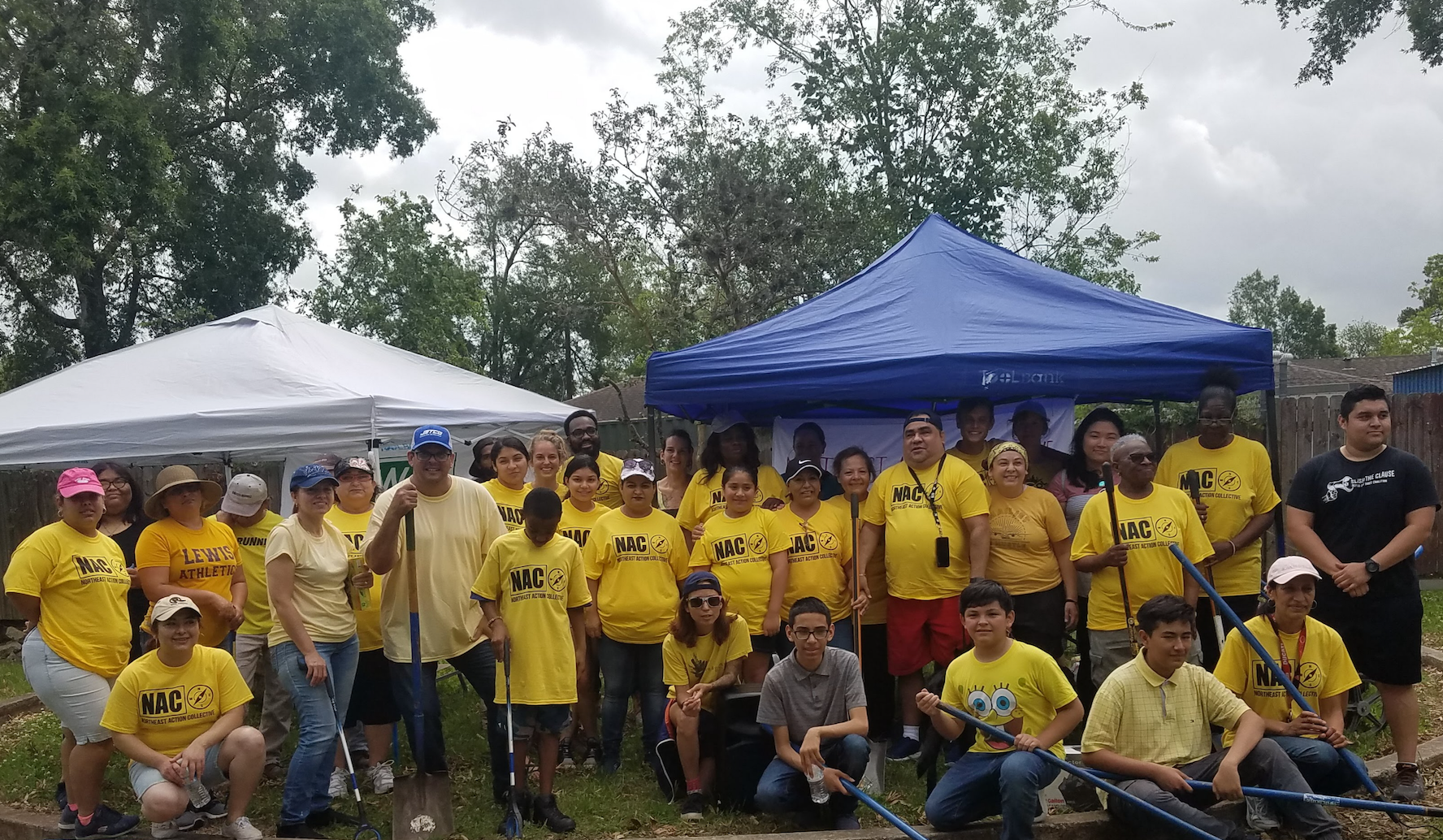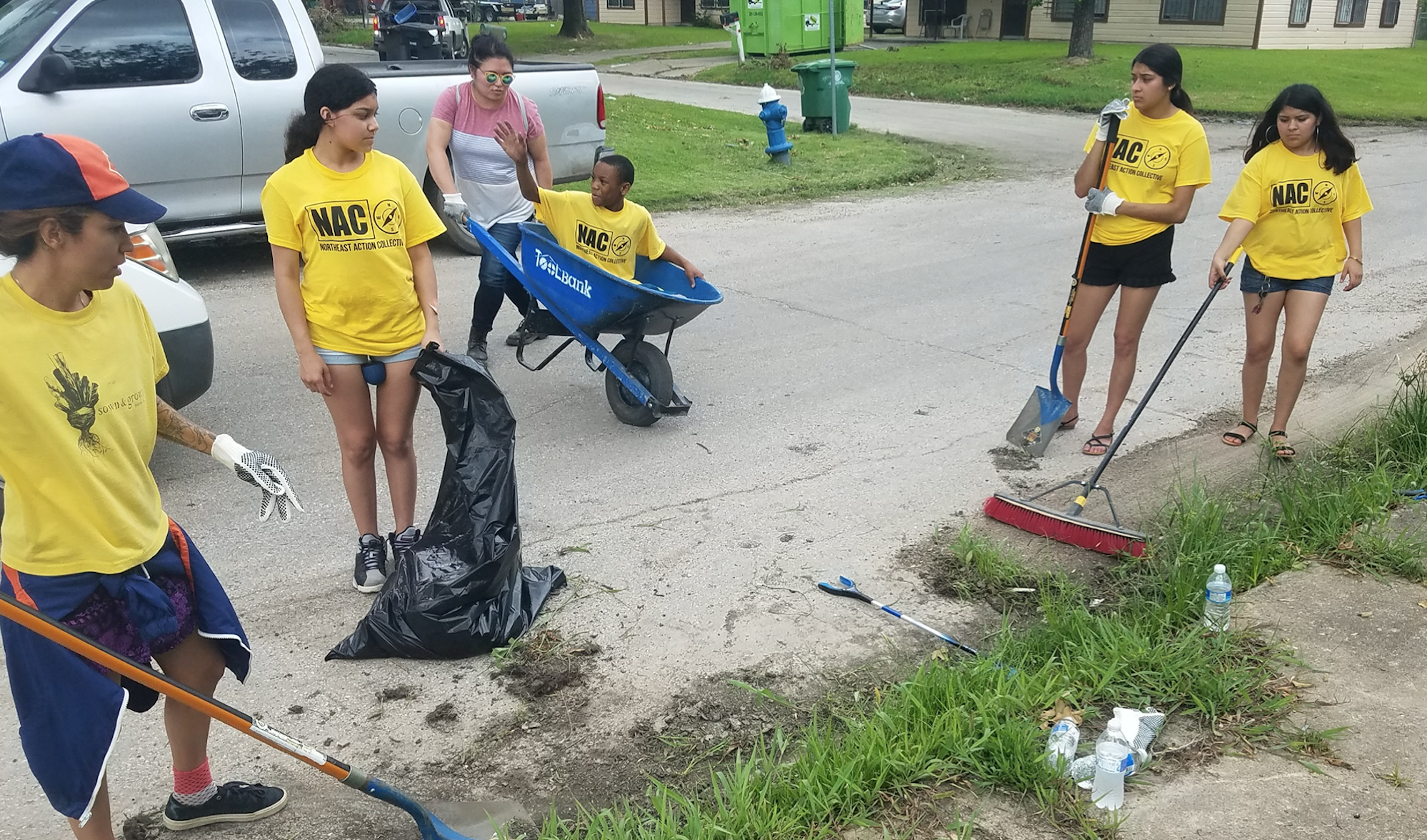Ziola Villareal’s Lakewood neighborhood, a subdivision in East Houston, is considered to be low risk for flooding by Federal Emergency Management Agency Flood Hazard maps. But for the residents gathered in mid-May to talk about the area’s needed drain cleanup, 14 documented floods in the area since 1970 suggest otherwise. Villareal’s family has called East Houston home for 30 years and according to her, the flooding has only gotten worse in recent years. "Before, the water used to flow freely back into the bayous, but now it takes days, sometimes weeks, to leave the streets,” said Villareal.
Residents have been trying to address the issue for a while now. Back in October 2018, Villareal and a group of residents gathered near the East Houston Civic Club, housed in an old white wooden school building, to talk about how to combat flooding. It was a diverse group. Some participants were Spanish-speaking only, relying on interpretation from Antena Houston, an organization dedicated to providing interpretation in multiple languages. But they shared one important thing: they were all directly impacted by Hurricane Harvey and had received assistance from West Street Recovery, a nonprofit that was established following the storm. Beyond helping residents with rebuilding, West Street has served to inspire members within the community to mobilize, and not just around flooding.
During the aftermath of Hurricane Harvey, the community received assistance from various organizations, whose mission was to rebuild the structures of the homes. However, for a community that continues to be plagued by the lack of health care clinics, grocery stores and inadequate public transportation, the assistance they received typically only goes so far. West Street Recovery has helped the community do more than just rebuild, according to Doris Brown, a resident from East Houston. "They have actually shown residents the power of organizing because every home they finish is primarily done by volunteers,” she said. “So then I asked myself: why can't I do the same to address the other issues impacting my community?"

On Saturday, May 18, 2019, the group organized their first community cleanup event. Leading up the event, residents created flyers that they distributed to local churches and households and e-mailed local political representatives for assistance. Over 50 residents participated, including members from the local media. Groups of volunteers spread out throughout the community to clean out drains to help prevent future flooding. Several members delivered speeches, both in English and Spanish, on the day of the event.
"Our rebuilding efforts made [West Street] realize that there are a lot of issues in the community that extend beyond flooding,” said Jade Flores, a member of West Street Recovery. So the group started helping community members organize. The residents, said Flores, are driving the movement by organizing monthly community meetings, adopting their own name, Northeast Action Collective/Noreste Accion Colectivo, logo, t-shirts, agenda and plan of action.
The collective helps brings together years of effort from many community members who are hopeful for better results. Myrtala Tristan, an active participant of the group since its inception, feels that West Street Recovery assistance in organizing is vital towards addressing other issues impacting the community. Tristan has been trying for years to get the city to address issues of illegal dumping, stray animals and street flooding to no avail. "I felt that maybe by organizing, the city can finally start addressing these issues" she added during one of the group's now monthly community meetings and at the cleanup event.
"It’s amazing how engaged everyone has been since the group was formed," said Ben Hirsch, another member of West Street Recovery. "Everyone is always eager to share ideas and put them into action. The community cleanup really showed them and everyone outside the community that they have power in numbers and that anything is possible." Becky Selle, who has co-facilitated some of the group's monthly community meetings, describes the effort as some of the most rewarding work that she has done. "Not only are we rebuilding people's houses, but now we are helping to empower a community. This is a great feeling," she added.
The hope is that, following the May event, even more residents. Currently, the group is in the process of compiling all the information that they gathered from the community cleanup in order to create a plan that they will present before city council and commissioners court.
The group hopes that the plan will allow public officials and other entities to start taking notice of their community, which they feel does not get the attention that it deserves. “I love East Houston,” said Ann Watson, who grew up in the community and has lived there since the 1970s. "I just want our community to receive the same level of respect that more affluent areas receive. We are more than the illegal dumping, stray animals, and overflowing water that runs through our streets. We are human beings. East Houston demands the best like any other community in the city. This is what I want our group to accomplish: respect."
Juan Antonio Sorto is a doctoral candidate in the department of urban planning and environmental policy at Texas Southern University.

